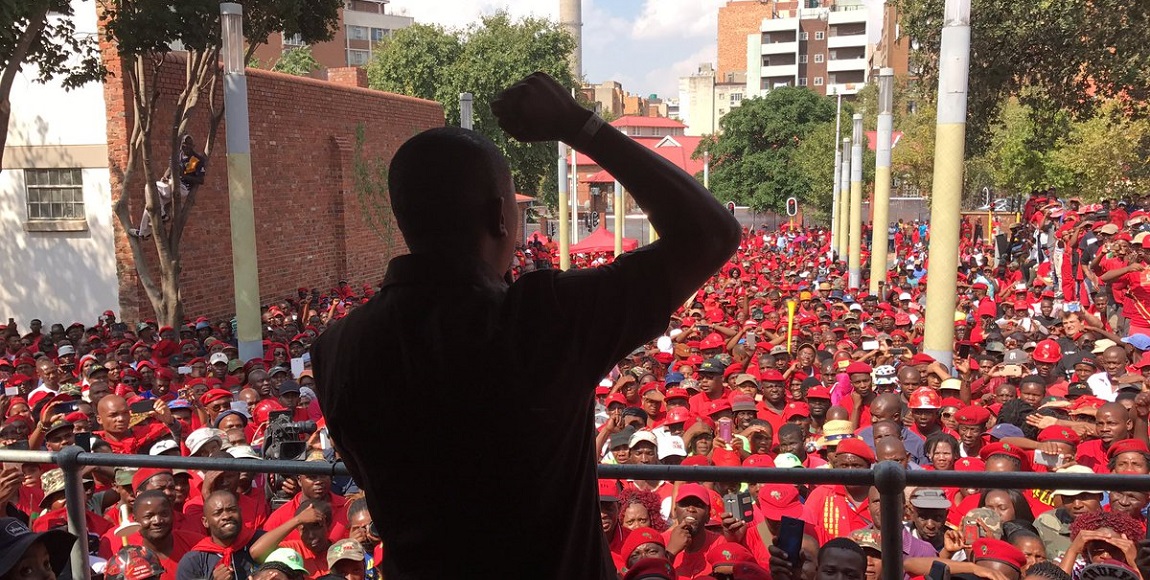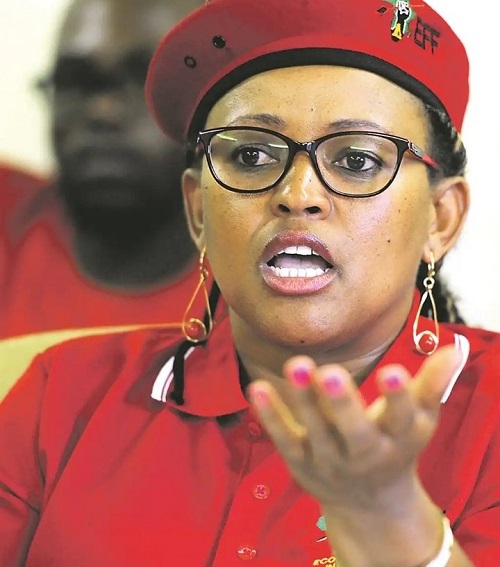It’s difficult to believe that the Economic Freedom Fighters (EFF) was only formed in 2013. In just six years, the party has established itself as a formidable opposition and is the third largest political party in South Africa. Led by the dynamic, and often contentious, self-styled ‘Commander-in-Chief’ Julius Malema, the party revels in controversy. But it has led some of the most important political conversations in the country. The party was front and center in conversations about land ownership, workers rights and justice for the Marikana mineworkers and free education.
This is the third election that the EFF will contest. And this time, the EFF wants to take its place in government. “We want to win, there’s no one that contests to lose,” EFF Gauteng provincial chairperson Mandisa Mashego said in an interview with The Daily Vox.
A socialist revolution that mobilises democratically, with a side of Pan-Africanism
EFF Gauteng Provincial Chairperson Mandisa Mashego
The EFF views state power as a vehicle through which socialism can be realised, Mashego said. Through socialism South Africa, and Africa, can also unlock economic freedom. Considering the party’s Pan-African agenda, it’s important for their goals to extend throughout the continent.
The party can appreciate that the ruling African National Congress (ANC) delivered democracy and the right to vote in 1994. However, Mashego says, the EFF cannot tolerate “black people to be used as voting cattle to sustain imperialism and fund their own abuse and oppression capitalist, imperialist forces,” she said. These forces have undermined and continue to undermine Africa and other black nations globally. The party is reluctant to join forces with these parties to form coalitions.
EFF: outright majority, not coalitions
“We are not in favour of coalitions, we want to win outright,” Mashego said. In 2016, after the local government election, the EFF and the Democratic Alliance (DA) forged a coalition to kick the ANC out of important metros. “We were not comfortable going into a coaltion with racist, white supremacists who are xenophobic, spreading black on black violence,” Mashego said.
As for the ANC, Mashego says the EFF needs to “reign in the criminal element in the ANC which is institutionalised now”. “We cannot trust the ANC with key implementing institutions and core governance frameworks because we will undermine what we are trying to achieve,” Mashego said.
African, black women are the face of South Africa’s inequality
The World Bank ranks South Africa as the most unequal society in the world. This, Mashego said, translates to racial and gender inequality. “African black women remain at the bottom of society,” she said. African women, Mashego says, are “economic punching bags for white, Indian and even coloured men and women in corporate environments”, and “physical punching bags for black men”.
“We seek to liberate the African woman and young child… African women are crucial for societal progress. The single black mother is producing presidents like Julius Malema, doctors, scientists, engineers who happen to be men in the name,” she added.
Besides that, the EFF will fight imperialism, capitalism, racism, white supremacy, and any race group that suppresses African people, particularly women and young people, she said.
This will be achieved through state power.
“If you don’t have state power when you are black, a white or Indian person looks at you like a slave or inferior person,” Mashego said. This is even if a black person holds a top position in a big company, or is furnished with the privileges of Broad-based Black Economic Empowerment. “The only time they will view you differently is when you start having ownership and control,” she said. This starts with land expropriation without compensation.
The state must control the land
“We redistribute our land, and we cannot be told by anyone that this is not our land,” Mashego said. The EFF is well-known as the party that ushered the land question into parliament. Since its inception the party has been campaigning for land expropriation without compensation, which is one of its pillars for economic emancipation. In 2018 the ANC supported an EFF-introduced draft resolution for parliament to establish an ad hoc committee to deliberate a constitutional amendment to allow expropriation of land without compensation.
“We want land to come into the full ownership of the people through government,” Mashego said. However, this government has to be “corruption-free” to redistribute the land for residential, industrial, commercial and public use, she said. The EFF believes it is the “corruption-free” government to oversee land ownership.
This isn’t a far-fetched concept, Mashego says. Singapore did something similar. Even currently, the state is in charge of certain pieces of land. For example, Mashego says, if you want to open up a factory, you have to apply at the specific municipality.
“The state must have total control over who operates what, where and how,” Mashego said. However, the state must fulfill certain conditions to own the land. It must decide how to use the land in an environmentally responsible way. A strong government and strong frameworks including the police and justice systems must support land policies.
The party wants to introduce a Land Reform Act and the Agrarian Reform Act into parliament. In conjunction the EFF wants to establish a Land Council so citizens can apply for land use rights. Aggrieved citizens will also have a right to go to the Land Ombudsman. This way, Mashego says, “your rights will be more protected than they are now.”
The EFF has a three-tiered plan for equality using the land.
A detailed land plan
Firstly, the EFF will prioritise land for residential use. “We will prioritise black women, black mothers with responsibilities and jobs,” Mashego said. “An overwhelming majority, not 50%, of the land must go to black women,” she added. After that, the state will prioritise land for special economic trading zones. This land will be used to industrialise and beneficiate the mineral and natural resources through agro-processing, small-scale farming and mining. It will also be used to develop industrial projects alongside interested big companies. As for public land, the EFF will also nationalise all game reserves.
White people have arrogance along with the majority of the Indians because they have a larger share of the economy, Mashego says. “Between the two of them they have less than 3% unemployment when the indigenous South Africans must endure 50% unemployment among youth and over 34% amongst adults essentially rendering us slaves to white and Indian South Africans. It’s unsustainable socially, economically and not in line with Pan-Africanism,” she said.
The EFF also wants to pursue an aggressive plan for job creation, which will all be possible with state control of key sectors. This includes the previously mentioned special economic zones. “We pushed for all government jobs to have no less than 50% women and black youth,” Mashego said. The EFF wants to “liberate” women.
The EFF women are represented
There is an absence of a Women’s Command in the EFF, however the Constitution requires that the party must eventually establish one. “The EFF will decide when it establishes a Women’s Command,” Mashego said. However, women are represented in the party, Mashego said.
“We demand 50% women’s leadership. We want women to contest chairperson positions from branch-level going up,” she said. Female chairpersons should have the same power as their male counterparts. “We currently have two female chairpersons in provinces,” Mashego said – and she is one of them -, “but provincial leadership has a high level of women, sometimes a majority”. Like the ANC, EFF party lists also start with women so they have a higher chance of having a female majority.
On April 18, the EFF women organised a Women’s March. Hundreds marched to the Constitutional Court demanding government to transform the criminal justice system to deal with gender-based violence. The party wants to amend existing legislation to include harsher minimum sentences for crimes committed with hatred. They also want better trained judges and magistrates. The aim is to increase the conviction rate close to 100% for guilty parties, she said. This will ensure no criminal gets away with beating and raping women, children, elderly people and members of the LGBTQI population.
The rise of the EFFSC and the youth in the EFF
As one of the youngest parties in South Africa, the youth has always been represented within EFF structures. “The youth, in my estimation, is represented in the party,” Mashego said.
In the Gauteng provincial leadership Mashego and her deputy are the only EFF leaders over the age of 40, she said. Even the top five members of the EFF are younger than the two. The majority of regional command team members are also in their 20s and 30s, Mashego said. “The youth have a huge influence in the EFF,” she added. The EFF Student Command (EFFSC) is a sterling example of this.
The EFF has empowered the EFFSC with relative autonomy, Mashego said. “But they are owned by the EFF, started by the EFF, their principles are based on the EFF’s founding principles, they abide by our constitution,” she said. “They have the power to operate on their own terms to mobilise universities, colleges and even high schools on their own terms,” she said.
“Over the last two years, we have minimised our presence in the EFFSC greatly. This signifies their influence and our confidence in them,” Mashego said.
The EFFSC has a strong presence on South African campuses and has been instrumental within the Fees Must Fall movement in those campuses. The party itself has always supported the movement. “Education must be free up to the first degree,” Mashego said. “It must be decolonised as a matter of urgency to realise a borderless, united, law-abiding, economically vibrant Africa,” she added.
The EFF also does not interfere with EFFSC leadership. “They develop their own democratic processes to elect representatives,” she said. The EFFSC victories within student representative elections across campuses indicates that the small youth voice is valid in the EFF, Mashego said.
However, as Mashego points out, the EFFSC are not a youth organisation. “The EFFSC only mobilises public universities and Technical and Vocational Education and Training colleges. Those don’t even represent 10% of South Africa’s youth who are in the township, unemployed or working [unskilled] jobs,” she said.
All the party’s policy consultation meetings have an EFFSC presence, Mashego said. There are also several former EFFSC members on the EFF party lists.
What change these young figures will bring, we wait to see with bated breath.










